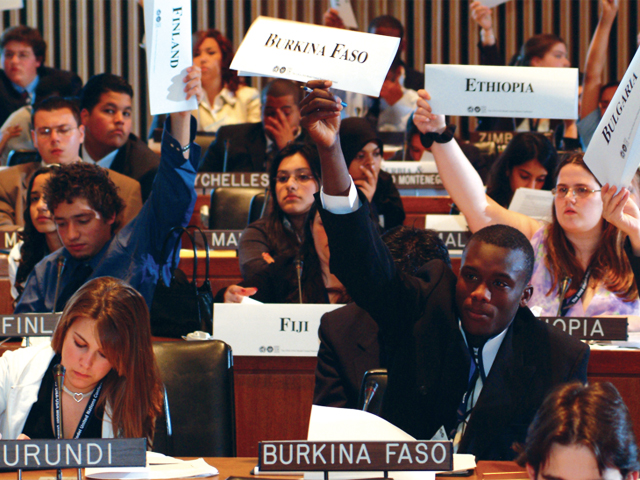It’s easy when you’re in committee session to get caught up in the thrill of debate. The essence of MUN is about diplomacy and decorum, and therefore it is important that you remember to use your manners when in committee. Not only will they help you win Best Delegate, but they will contribute towards you leaving the weekend having made genuine and lasting friendships.
Here are some tips that you should remember the next time you’re in a committee session:
1) Introductions: Over the course of the conference you will have to introduce yourself over and over again. Not only is it important that you introduce yourself in a memorable way to your fellow delegates and chairs, it is even more important that you introduce your country in the best manner possible. Each time there is a roll call vote, you need to show the best etiquette that your country has to offer. The best way of doing this is to stand up (every time), hold your placard clearly in front of you, address the Dias directly and use the official full title of your country. Most delegates will do this on the first day, but by the last day delegates can get complacent. You need to show you’re still serious on day 3.
2) Language: The first thing you’re taught when you begin your MUN journey is the way you need to address the committee. This, of course, means the importance of ‘Honourable Chair/Distinguished Delegates.’ Most delegates will almost always begin their speeches in this manner, however it’s just as important to begin your 15 second moderated caucus comments in this way as it is your Opening Speech. It shows the Dias that your ability to remain diplomatic and professional supersedes your need to say as much as you can in 15 seconds. Furthermore, no matter how friendly you have become with your chairs and fellow delegates over the few days, try not to make your speeches too informal. It’s very important that you first represent your country to the committee before you represent yourself to your new friends.
3) Time: Keep your speeches to time. It can be difficult to say exactly what you need to in a short amount of time, but if the director has tapped the gavel to indicate time up, finish quickly (but don’t rush), say thank you and sit down.
4) Behaviour towards the Dias: You may not realise this, but the Dias put in a huge amount of work both before and during the conference. Delegates become so caught up in debate, that they often forget this. Treat your chairs well, not because you want them to give you an award, but because they deserve it. When it looks as though they’re not calling on you, don’t pull faces in exacerbation, or roll your eyes to a fellow delegate across the room. Continue engaging in debate, keep raising your placard and the Dias will recognise your professionalism.
5) Behaviour towards delegates: It’s tempting to use all the time you get to show other delegates why they should work with you, but remember that you’re also there to meet new people. It’s always a shame when the first time you meet a delegate, they ambush you with facts and figures to try and get you to vote for the topic they want to discuss first. We all appreciate eager delegates, but first impressions count. When you first meet another delegate, use the opportunity to get to know them. Have a genuine interest in them and what they do. That way you’ll have gained a new potential signatory, but more importantly, a new friend.
6) Points of Order: If you have a genuine point of order, by all means raise it when it is appropriate. However, if it is possible to frame it as a Point of Parliamentary Inquiry, try and do so. It shows your aim isn’t to show off in committee or to call out your chair.
7) Placard Waving: PLEASE don’t wave your placard in an attempt to get the Dias to notice you. Chances are that they have noticed you but are calling on other delegates to expand debate. It’s extremely rude and makes you seem very impatient.
8) Thank You: Try to say thank you as much as you can during your speeches, during caucuses and within your bloc. It shows that you recognise the efforts put in by all delegates and that you give credit where credit is due.
9) Finally, Smile! It’s important to take your role in the conference seriously, but remember to smile wherever and whenever appropriate. It’s polite and respectful, and leaves an excellent impression.


